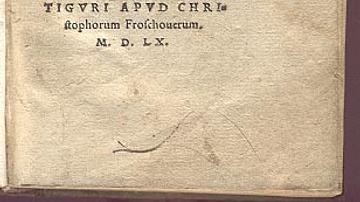Search
Search Results

Definition
Commodus
Commodus was Roman emperor from 180 to 192 CE. With the death of Roman Emperor Marcus Aurelius in March of 180 CE, the long reign of the five good emperors came to an end and with it so did the Pax Romana (the Roman Peace). Those emperors...

Definition
Titus Andronicus - Shakespeare's Bloodiest Play
Titus Andronicus is the earliest tragedy by William Shakespeare (l. c.1564-1616), probably written sometime between 1589 and 1593, and first performed in 1594. Infamous for its gratuitous violence and two-dimensional characters, Titus Andronicus...

Article
Roman Students in Athens
Training in oratory was a crucial part of Roman education; it was associated with a young boy's transition into adult life. As Athens was considered the intellectual centre of the eastern Mediterranean, many students undertook long journeys...

Article
Legions of Noricum, Raetia & Dacia
The provinces Noricum, Raetia, and Dacia served as a buffer protecting Roman Empire against any possible outside threat. However, the region posed several internal problems for Rome: Pannonia and its ally Dalmatia rebelled against Roman occupancy...

Definition
Roman Triumph
A Roman triumph was a spectacular celebration parade held in the ancient city of Rome for a military commander who had won an important victory on the battlefield. Granted by the Senate, it was a lavish and entertaining propaganda spectacle...

Image
Procession Relief, Ara Pacis
A portion of the marble procession relief from the Ara Pacis Augustae in Rome, c. 9 BCE. The hooded figure has been identified as Agrippa. (Museo dell'Ara Pacis, Rome)

Definition
Second Triumvirate
The Second Triumvirate was a political association of convenience between three of Rome's most powerful figures: Mark Antony, Lepidus, and Octavian in the 1st century BCE. Following the assassination of Julius Caesar the three vowed revenge...

Definition
Octavia Minor - The Sister of Augustus Who Helped Birth the Roman Empire
Octavia Minor (circa 69 BCE to 11 BCE) was a Roman noblewoman who rose to prominence during the early years of the Roman Empire. The sister of Emperor Augustus (reign 27 BCE to 14 CE) and wife of Mark Antony (83 BCE to 30 BCE), she was known...

Definition
De Officiis
De Officiis is a treatise written by Marcus Tullius Cicero (106 – 43 BCE), Roman statesman and orator, in the form of a letter to his son just after the death of Julius Caesar in 44 BCE. Strongly influenced by stoicism, De Officiis is divided...

Definition
Roman Republic
In the late 6th century BCE, the small city-state of Rome overthrew the shackles of monarchy and created a republican government that, in theory if not always in practice, represented the wishes of its citizens. From this basis the city would...